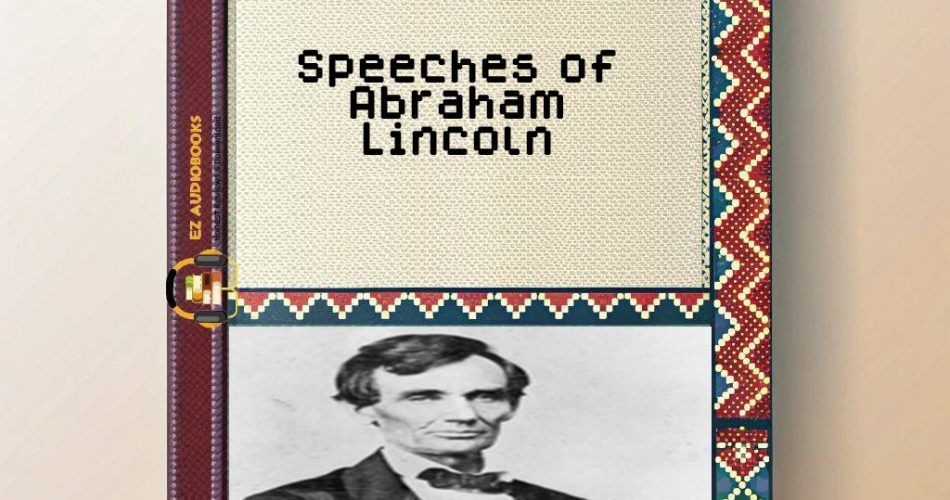Audiobook Sample
Listen to the sample to experience the story.
Please wait while we verify your browser...
- Title: Speeches of Abraham Lincoln
- Author: Abraham Lincoln
- Narrator: Andrew Julow
- Length: 01:14:00
- Version: Abridged
- Release Date: 01/01/2012
- Publisher: Ejunto
- Genre: History, North America
- ISBN13: SABEJU9780009
There are few voices in American history that resonate as profoundly as Abraham Lincoln’s. Listening to “Speeches of Abraham Lincoln”, narrated by Andrew Julow, is not just an academic exercise – it’s an immersion into the moral and political struggles that shaped a nation. As someone who has spent years analyzing cross-cultural narratives and the evolution of political rhetoric, I found this audiobook to be a remarkable synthesis of historical significance and oratorical artistry.
“Initial Impressions and Personal Connection”
The first time I encountered Lincoln’s speeches was during my undergraduate years at Yale, in a course on American political thought. Our professor had us read the Gettysburg Address aloud, dissecting each phrase for its rhetorical power. That experience stayed with me, much like my later discovery of Murakami’s bilingual narratives in Tokyo – both revealed how language can shape collective memory. This audiobook brought back those formative moments, but with added dimension: hearing Lincoln’s words performed adds layers of emotional resonance that silent reading cannot capture.
“Themes and Historical Context”
Lincoln’s speeches, spanning from the Cooper Union Address to the Second Inaugural, are masterclasses in persuasive rhetoric. Key themes emerge with striking clarity:
1. “Union and Division”: Lincoln’s unwavering commitment to preserving the Union reflects his belief in democracy’s fragility. His 1861 inaugural plea – “We are not enemies, but friends” – resonates eerily in today’s polarized climate.
2. “Moral Evolution”: The progression from cautious anti-expansion of slavery (1850s) to the emancipationist vision of 1863 mirrors America’s own halting journey toward justice. As I often tell my Berkeley students, texts are living documents that reflect their historical moment while transcending it.
3. “Democratic Ideals”: The Gettysburg Address’s “government of the people” formulation distills democratic theory into 272 words – a feat comparable to Confucian analects in its concise wisdom.
“Narration and Audio Quality”
Andrew Julow’s narration deserves particular praise. His baritone carries the weight of Lincoln’s words without slipping into melodrama – a balance I’ve rarely encountered since hearing Japanese kabuki narrators blend tradition with modernity. Julow:
– Masters Lincoln’s cadences, especially the deliberate pauses in the Second Inaugural (“With malice toward none…”)
– Differentiates between speech contexts, giving courtroom vigor to the Douglas debates while rendering the Lyceum Address with philosophical gravitas
– Avoids the common pitfall of over-emoting historical texts, trusting Lincoln’s words to convey their own power
The production is crisp, though I occasionally wished for period-accurate ambient sounds (e.g., crowd murmurs during political addresses) to enhance immersion – a technique I’ve admired in experimental audiobook adaptations like “Lincoln in the Bardo”.
“Comparative Analysis”
Placed alongside:
– “Frederick Douglass’s narratives”: Lincoln’s institutional focus contrasts with Douglass’s personal testimony, creating a dialogic tension central to understanding 19th-century reform.
– “Churchill’s wartime speeches”: Both leaders used rhetoric to sustain national purpose, but Lincoln’s biblical cadences (“A house divided…”) feel more rooted in communal ethics than Churchill’s imperial resolve.
– “MLK’s “I Have a Dream”: The lineage from Lincoln’s “new birth of freedom” to King’s promissory note showcases how rhetorical DNA evolves across centuries.
“Critique and Limitations”
No collection is exhaustive – I missed Lincoln’s 1842 Temperance Speech, which reveals his early rhetorical strategies. The audiobook also doesn’t contextualize each speech’s immediate impact (e.g., how Copperhead Democrats reacted to the Cooper Union Address), information that would help casual listeners. As someone who researches digital storytelling, I believe supplementary online materials could bridge this gap.
“Recommendations”
Ideal for:
– History educators seeking primary sources that captivate students
– Writers studying concise persuasion (Lincoln’s 1860 election eve speech is a 5-minute masterpiece)
– Citizens navigating contemporary political discourse, as these speeches model how to address division with principled clarity
“Final Reflections”
Returning to these speeches during the 2024 election cycle has been revelatory. Lincoln’s warning about mob rule in the 1838 Lyceum Speech – “the gates of hell” prevailing over divided houses – feels urgently contemporary. This audiobook isn’t merely a historical artifact; it’s a mirror and a compass.
In scholarly solidarity,
Prof. Emily Chen

